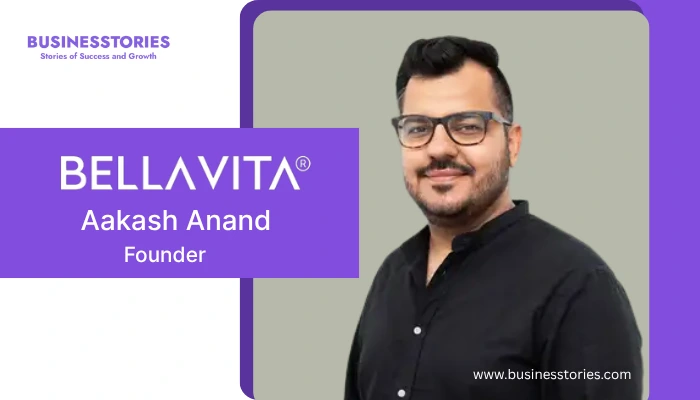In the crowded universe of Indian consumer brands, few stories are as compelling as that of Aakash Anand, the founder behind BellaVita Organic. What began as a family experiment in salon products evolved into a multi-crore D2C empire, and now, a new chapter as a builder of startups. This is the complete journey only: ambition, iteration, scaling, exit, and reinvention.
Origins & First Sparks (Pre-2018)
The seeds of BellaVita were planted long before its official launch. Aakash Anand’s family was already into the wellness and beauty space via salons in Gurugram, run by his mother Anju Anand and sister Ashima Anand. The salons would often substitute branded hair or skincare products with homemade mixes like curd-and-egg hair packs instead of branded products — which began attracting client curiosity.
In an exclusive interview, Aakash once said:
“When people would come in for a hair spa, instead of using regular salon products, they opted for their egg-and-curd mixture. That was the unique selling point of the salons.”
The family business was actually small, these early experiments offered a proof point: clients were willing to trust “natural / homemade” formulas if they delivered results. More importantly, it sowed the belief that the beauty and wellness space could be reimagined beyond conventional brands.
After completing his education, Aakash worked in various roles including in marketing and business expansion verticals. He had been associated with Qdesq as Head of Business & Expansion, and earlier with SquareConnect under Square Yards.
But the pull toward building something of his own was strong. In mid-2018, he decided to join the family’s beauty vision full time, and set the stage for launching BellaVita as a consumer brand.
2018: Birth of BellaVita & Early Years
The official founding of Bella Vita Organic (or BellaVita) is recorded in 2018, branching off from the family’s salon experiments and leaning into the rising D2C wave.
Early on, the brand prioritized three business strategies:
- Natural herbs and plant-based ingredients that Ayurveda uses for health and in beauty.
- Affordable pricing for Tier II / III markets
- Digital marketing and customers reach via e-commerce platforms
In a Mediabrief interview, Aakash articulated how BellaVita’s USP was anchored in being “Ayurveda-backed modern skincare solutions – products that are safe, affordable, dermatologically tested, cruelty-free.” He emphasized wanting to democratize self-care.
He also noted a key brand philosophy — pushing skincare beyond gender boundaries:
“Skincare is often associated with women … We aim to break through this gendered clutter and bring skincare and self-care to everyone.”
Early sales were modest, product SKUs limited, and the primary channel was e-commerce. Further growth required expanding both the product range and sales channels. But the team rapidly iterated based on customer feedback and consumer demand.
2019–2020: Traction, Learning & Challenges
As BellaVita gained traction in smaller Indian cities through online platforms – its own site, the brand encountered operational hardships typical of consumer D2C scale ups: supply chain bottlenecks, cost control, customer acquisition costs (CAC), packaging challenges, and brand visibility.
In a podcast feature titled The Perfume Man of India, Aakash shared:
“Do not complicate business building and focus on unit economics regarding profit calculations. Test with small amounts first, then scale up fast once results are good.”
He also touched on the challenge of CAC (Customer Acquisition Cost):
“Why CAC is stupid?” he said, stressing that founders should focus more on LTV (Life Time Value) and retention metrics than just the cost of acquiring.
Meanwhile, the brand began expanding SKUs (fragrances, haircare, skincare blends) and refining its supply and manufacturing processes. The goal was to hit a critical scale where brand marketing could sustain itself.
2021: $10M Series A & Revenue Inflection
A landmark moment came in July 2021, when BellaVita raised US$10 million from Ananta Capital in a Series A round. This funding round was widely reported in Economic Times and it received significant attention in the publication.
The article noted:
“Bella Vita Organic is on track to achieve Rs 100 crore in annualised revenue run rate, with the company itself positioned to reach this milestone. The company has been profitable since inception.”
That funding provided capital for scaling marketing, expanding SKUs, and strengthening business operations. For a D2C brand, the traction shown until then — including unit economics and retention metrics — must have convinced investors that the model could scale sustainably.
This capital infusion marked a transition: BellaVita was no longer just a niche startup — it was an emerging mid-sized consumer brand with institutional backing.
2022–2023: Scaling, Diversification & Brand Maturity
In this phase, BellaVita grew from a niche D2C entity into a brand with multiple SKUs and a stronger online presence. According to public interviews, Anand and his team emphasized:
- Omni-channel presence, including marketplaces and their own app or website, not only depending on one single platform.
- House of Brands and portfolio approach, incubating sub-brands under IDAM as the parent company across cosmetics, pet care, etc.
- Intensified brand marketing to build emotional connections with customers, not just transactional buyers — capturing repeat customers over time. In a MediaBrief interview, Aakash said that BellaVita wants “the self-care space to be accessible to everyone, irrespective of age or gender.”
In the Mad Over Growth podcast, he walked through how he scaled BellaVita’s Amazon presence, leveraged influencer marketing, and improved consumer psychology in pricing.
In the ISV podcast episode, he also discussed:
“House of Brands,” effective people management, founder energy, and how big companies are formed from small experiments.
By this time, BellaVita was being referred to in media as a “600 crore perfume brand.” this recognition showed the company’s significant growth in the market.
2024: Exit and Strategic Shift & New Ventures
In April 2024, Aakash announced the launch of Wolfpack Labs, a venture studio aimed at supporting idea-stage and early-stage startups. As Entrepreneur India reports:
“INR 25 lakhs to INR 1 crore will be the typical check size for seed/pre-seed investment.”
The article also quotes Aakash:
“The idea behind Wolfpack Labs is rooted in my journey as a young entrepreneur. India’s young entrepreneurs are definitely having great ideas, but they actually need more support and guidance to succeed.”
He also explained the naming ethos:
“We chose the name Wolfpack to signify the strength and unity of a pack led by the alpha leader. The essential traits of a wolfpack, such as patience, curiosity, teamwork, planning, perseverance are the key leadership qualities that differentiate successful founders.”
At the same time, BellaVita’s parent / affiliated umbrella, IDAM House of Brands, continues to hold multiple D2C verticals and brands under its fold.
Another project in Aakash’s portfolio is Unikon.ai, a platform that allows professionals and creators to monetize their time, knowledge, and advice. News report indicates a seed raise and cofounders including Palash Arneja and Sumit Jha.
One write-up state:
“What is his next big investment decision regarding future business ventures? Basically, Unicorn is the same platform where your time equals money – a billion-dollar company that helps people make money from their knowledge.”
In interviews, he frames this shift as a natural extension of his journey: from building a D2C brand to enabling others to build scalable, mission-driven ventures with clear goals.
Founder Mindset: Manifestation, Energy & Personal Philosophy
Aakash’s public persona often includes reflections on mind-set, the law of attraction, and founder energy. In a podcast titled Law of Attraction changed my Life, he shares how he uses visualization and positive belief as part of his mind-set toolkit.
From that episode:
“Surround yourself with the right people, write & visualize the goals and be grateful” — guiding principles he uses to maintain focus and stay grounded.
In Sonu Sharma’s channel, he called out failures as more important than success, recounting how early breakdowns shaped his learning curve.
These aspects of mind-set are not just showmanship — for many founders, these mental frameworks help sustain grit through the long slog of scaling. Aakash appears to infuse his public narrative with both practical tactics and inner resilience.
Key Founder Lessons from Aakash Anand’s Journey
- Start with what you know — then expand.
Aakash did not come from scratch; he leaned on incremental experiments from the family salon and scaled what worked. He tested small before going big. - Focus relentlessly on unit economics and retention.
Across podcasts, he warns against vanity metrics. Better to build profitable growth systems that sustain themselves rather than chase large-scale customer acquisition at high costs that cannot be maintained further. - Brand, product and operations all matter.
Many D2C brands depends too much on marketing and need to focus more on their products. BellaVita balanced product development, supply chain scaling, and packaging to keep customer trust. - Strategic capital infusion, not blind fundraising.
The $10M raise from Ananta Capital was timed when business metrics validated the model. He often cautions founders not to “chase funding” early. - Leadership, culture, and founder energy are compounding.
In interviews, he often emphasizes emotional stamina, surround-yourself mindset, and consistency as underestimated assets for founders. - Reinvent yourself.
Exiting or partially exiting of business does not have to mean retirement. For Aakash, it became the springboard to Wolfpack Labs and Unikon.ai — deploying his experience as fuel for the next wave.
Also Read: Reshma Saujani: Champion for Girls in Technology
Why Anand’s story matters: three founder lessons
- Vertical focus before horizontal expansion. Basically, go deep in one area first, then expand to the same level in other areas. BellaVita initially doubled down on fragrances and select personal-care categories, building product mastery before adding adjacent SKUs. This lowered complexity at launch and built brand credibility.
- Use digital channels as an engine, not an accessory. By leaning into paid social media, influencer marketing, and direct ecommerce, Anand kept CAC and LTV dynamics under constant measurement — the D2C playbook that leads to repeatable growth.
- Exit strategically, then multiply impact. The Ananta Capital stake and associated capital gave Anand runway and credibility to launch Wolfpack Labs — a move that converts founder experience into a scalable platform for many startups.




